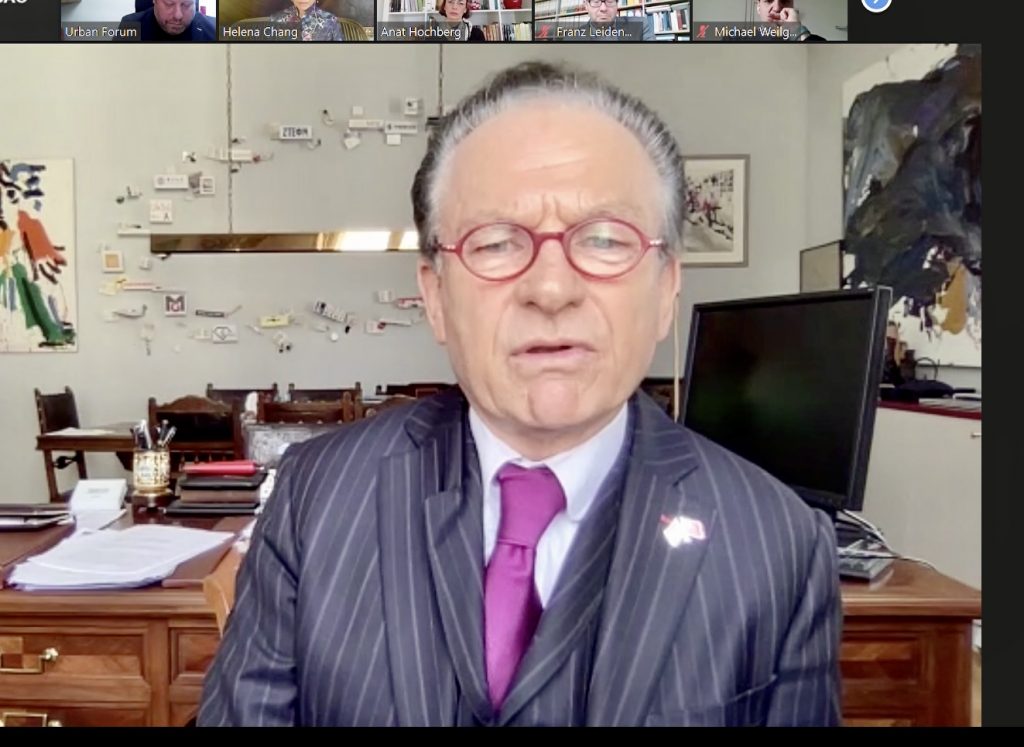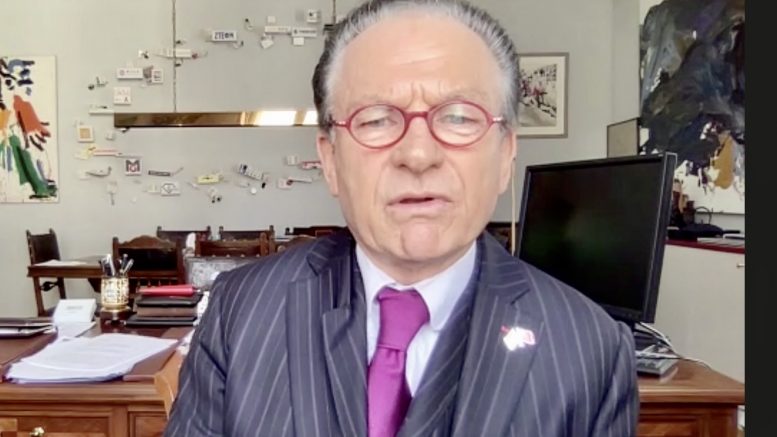
On 17, March 2021, Dr. Georg Zanger, well-known lawyer in Vienna and President of ACBA, participated in the forum on “Terror Attack, Security & Human Rights” as an honoured panelist. His views on the related issues are as always clear, poignant and eye-opening. Following are his answers to the questions asked to him during the forum.
On Human rights:
Since the 1990s, the global spread and intensification of terrorism and extremism has had devastating consequences.
Terrorism and extremism threaten people’s lives and security, their dignity, their rights to life, health and development.
The fight against terrorism and extremism is a global challenge. Over the years, different countries and regions have taken different measures to prevent and counter terrorism and extremism, based on their respective historical and cultural traditions, their level of social and economic development, and the education and employment levels of their citizens.
The question that arises after 9/11 and the attack on the Bataclan nightclub in Paris is how to effectively combat terrorism:
– Through wars and bombings with 100,000 people sent dead as so-called collateral damage or
– through information, reconnaissance and simultaneous protection against further attacks.
In contrast to the method of area bombing used by the USA and other Western states, as in the Iraq and Afghanistan wars and most recently in Syria with hundreds of thousands of “collateral” deaths, the PRC has chosen a different – more peaceful – path.
The PRC, like other states in the world, must protect itself from the danger of Islamic separatist movements and is particularly at risk because of its geographical location. The northwestern province of Xin Jiang is the center of terror in China and particularly exposed due to the three-country corner of Pakistan and Afghanistan.
In the West, the extent of the weekly terrorist attacks and their consequences in this region is not known. Chinese media do not report about it as populistically as we do, also in order not to encourage copycats. In any case, it is remarkable that the terrorist attacks and the countermeasures are limited to this province, but not to other parts of the country. At any rate, this allows the assumption that it is not a matter of arbitrary human rights violations, but of measures that are necessary from the point of view of the political leadership there.
Finally, it is crucial to note that counter-terrorism efforts in China have been successful and there have been no acts of terrorism for about three years, something that Afghanistan, Iraq and Syria have failed to achieve despite years of warfare.
On Sir Geoffrey Nice and his “China Tribunal”:
The China Tribunal is one of the non-governmental institutions that critically examines China from a Western perspective. Among other things, it has looked into allegations of non-violent political prisoners in China and investigated what crimes, if any, have been committed by state or state-recognized agencies, organizations or individuals in China.
It is a private body with no official status, similar to an NGO. It has its headquarters in London. The Chairman of the China Tribunal is Sir Geoffrey Nice QC, formerly the lead prosecutor in the trial of Slobodan Milošević at the International Criminal Court. The Tribunal is a political institution run exclusively by avowed opponents of the PRC.
For example, it has dealt with alleged forced organ theft from members of the so-called Falun Gong movement in China and, most recently, alleged human rights abuses in Xin Jiang.
The China Tribunal declared the Chinese Communist Party guilty of crimes against humanity. The full opinion was published on 1 March 2020.
It is noteworthy that only those persons requested by anti-China groups were questioned. The origin and authenticity of the documents provided is doubtful. Without participation in the evidence gathering, without knowledge of the contents of the files, a closer assessment is not possible.
The PRC has refused to participate in the anti-Chinese tribunal.
On Counter-terrorism measures:
According to the Chinese “rainbow conception” of human rights, human rights include individual as well as collective, political as well as economic, social as well as cultural human rights. While “in the West” people tend to emphasize only individual human rights, the collective human rights of the Chinese people protect economic, cultural and political self-determination and development throughout the country.
These include the granting of autonomy in five national areas, the rights of the 56 different ethnic nationalities and the rights of minorities in their traditions, customs and traditions, as well as religious freedom.
In all constitutional states, it is permissible to criminalize acts and omissions and to impose prison sentences. Freedom of expression can also be restricted if it is necessary for security and public order.
China has ratified all major UN MR conventions and is committed to respecting human rights. In fact, some UN resolutions explicitly provide for the possibility of restricting human rights. For example, according to a UN General Assembly resolution of 16 December 1966, state authorities may restrict freedom of expression if it is necessary for the protection of national security, public order, public health and public morals and there is a legal basis for doing so.
There has been a terrorist attack in Vienna in which 4 people were killed. The excitement of the population was understandably enormous. So was the demand for effective counter-terrorism. Among other things, preventive detention for suspects and protective custody even after serving a sentence for participating in a terrorist act were demanded.
What do you think the Austrian people would have demanded if there had been such attacks every week and people had to be afraid to go shopping or even to visit a market?
Xin Jiang’s border with Afghanistan, Pakistan, Tajikistan and Kyrgyzstan requires vigilance against the infiltration of Islamist groups. There have been calls from Uyghur nationalists for the separation of the territory from China and, similar to the IS state, the establishment of an Islamic Republic of East Turkestan. Between 1990 and the end of 2016, separatists, religious extremists and terrorists planned and carried out several thousand terrorist acts such as bombings, assassinations, poisonings, arsons, raids and riots in Xin Jiang. Many innocent people were killed and several hundred police officers died in the line of duty. The material losses incurred were enormous.
The rest of the world hardly heard about it because the Chinese media refuse to sensationalize it in the media and especially want to prevent copycats from being activated.
However, individual terrorist incidents such as the knife slaughter at Kunming railway station and the pogrom against Han Chinese in Urumqi also became known to us.
The fight against the threat of terror and religious fanaticism is carried out exclusively on the PRC’s own territory. China does not attack any other country and does not need any pretexts to punish another country.
What is crucial, however, is that there has not been a single terrorist attack for almost 2 years now. This means that the measures to fight terror and protect the population have been successful.
It is remarkable that especially in the southwest of Xin Jiang, the focus of China’s poverty reduction program has been successfully applied. This also includes the promotion of business settlements, including foreign companies such as BASF and Volkswagen.
There is no doubt that human rights violations occur in China as in most other countries of the world. However, it is crucial to examine whether the state’s conduct is within the framework of legal norms.
In order to make a judgement, it is necessary to know the individual cases and to argue on the basis of the facts. It makes no sense to let sweeping prejudices flow into the assessment. After all, this prevents one from understanding Chinese society and, above all, from comprehending how China has managed to become one of the economically leading countries in such a short time.
On Xin Jiang re-education camps:
Education and training in Xinjiang are practiced in accordance with the rule of law in China. It also reflects the ideas and principles of counterterrorism and deradicalization as called for by the international community.
Over the past year, there have been a number of reports in the West of mass imprisonment and genocide-like incidents. However, there is no evidence whatsoever of the extermination of the Uyghurs through mass extermination. These are obviously deliberate politically motivated factual reports.
The claim about the number of people detained in re-education camps also does not seem to be serious and substantiated. Reports vary from 100,000 to 2 million people. In the absence of official figures, a serious assessment is not possible.
The PRC denies such a high number of people, but points out that the re-education camps were set up as anti-terrorist measures with a duration of stay of up to one year.
Xin Jiang has established vocational education and training centers in accordance with the law to prevent the emergence and spread of terrorism and religious extremism, effectively curbed frequent terrorist incidents, and protected the rights to life, health and development of people of all ethnic groups.
According to the Chinese government’s official account, the personal freedom of trainees in the education and training centers is protected in accordance with the law. The centers guarantee that the personal dignity of trainees is inviolable and prevent any kind of insult or abuse. They use a home training model that allows trainees to go home regularly and ask for leave to attend to personal matters.
The population structure contradicts these reports. The population in Xinjiang Province is about 45% Uyghur, who live in peace.
Uyghurs in Xin Jiang also welcome the government’s anti-terror measures. This is not surprising, because they also benefit from the security that has been created. As explained, there have been no terrorist incidents in Xin Jiang for almost three years, since the establishment of the training camps.
One more thing about the alleged persecution of Muslims in the PRC:
At its 46th session, the Council of Foreign Ministers of the Organization of Islamic Cooperation passed a resolution praising China’s efforts to take care of its Muslim citizens.


Be the first to comment on "On Human Rights and Uyghur Issues"